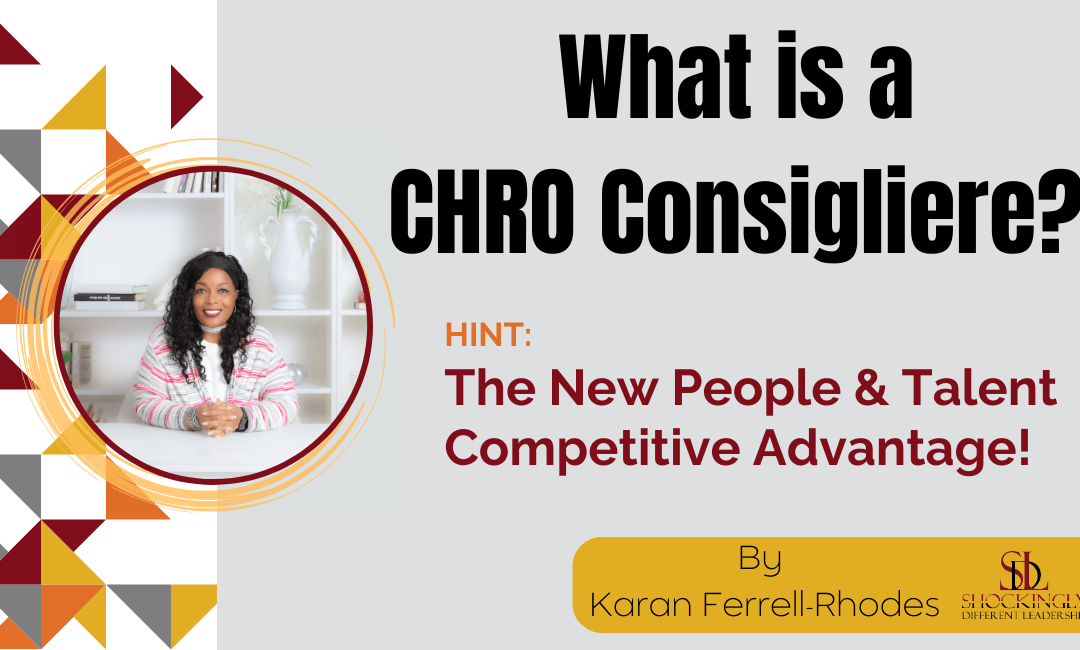This article was originally published on LinkedIn by Karan Ferrell-Rhodes.

Written by
Karan Rhodes
It’s no secret that HR functions are one of the most under-resourced and underfunded departments in the world of work. I get it. We’re commonly labeled as non-revenue producing or overhead costs. But it’s ironic how much employers depend on our function to maintain the organizational health of the very talent that drives revenue and business results. HR leaders are frequently forced to handle critical business demands and change management initiatives with a skeleton crew of headcount and a smidgen of budget. But miraculously, we somehow find a way, although we can be worse for the wear afterward.
A new role, called a CHRO Consigliere, has recently emerged across a variety of industries. It started in the private equity space but has now gained so much traction that the concept is rapidly becoming more mainstream.
What is a CHRO Consigliere?
Those who know me know that I am a movie connoisseur, so I’ll admit that the first thing that comes to mind when you say “consigliere” is the character of Tom in the Godfather movie trilogy. However, in reality, the actual definition of the term encompasses so much more.
A Consigliere is a trusted strategic advisor and confidante to an important person, who provides thought leadership and sound counsel so that the leader can more effectively influence, impact, and lead.
A CHRO Consigliere embodies the definition by providing executive-level, talent-focused thought partnership to the C-suite. The role frequently collaborates with the CEO and/or current CHRO (or highest-level HR leader). The CHRO Consigliere functions as a strategic HR consultant, to help leaders build, uplevel, or tweak the company’s People infrastructure and practices.

PROS: What’s cool about CHRO Consiglieres?
- They provide flexibility for HR functions to increase their capability and capacity to handle highly strategic, complex People initiatives on-demand, without additional headcount or the negative aspects of a typical external consultant.
- They provide a safe space for company leaders to plan major change efforts, such as organizational restructuring or HR technology implementation. Having a confidential thought partner delays the need to heavily involve current employees, thus minimizing unrest and disruption in productivity.
- They are equipped to take over the strategic tasks corporations don’t have the capability for or want to pay for in-house. Examples include compensation analysis, M&A due diligence, company culture projects, and talent acquisition of key roles.
- They focus on getting intimately knowledgeable with all key stakeholders and business operations, so that their ramp time is minimal when assigned new projects.
- They can be a true professional friend. It’s lonely at the top and a confidante that has your best interests at heart and is not vying for your job is a rare gift.
CONS: Wondering if there are any downsides to contracting with a CHRO Consigliere?
Yes, a few:
- They are hard to find. Truly skilled CHRO Consiglieres who have the ideal combination of a breadth of knowledge along with deep strategic skills is rare. Currently, the HR consulting world is like the wild, wild west in terms of expertise. Just because an individual was a former HR professional, doesn’t mean they are qualified for this type of role.
- They don’t come cheap but may still be worth the investment. CHRO Consiglieres usually charge the consulting rates of experienced experts, which vary wildly. I’ve personally seen a range from $125 -$750 per hour. However, you may be able to negotiate a better rate if you ask for a fixed-fee project rate or guarantee a minimum number of hours on retainer.
- They need additional ramp time when first brought on board. Although one of the first priorities of the CHRO Consigliere is to become deeply immersed in the people and operations of the company, they need a little time to do this work in order to be very effective. Lack of familiarity with company culture can spell disaster. However, once they gain this foundation of knowledge, ongoing projects should be a snap to start.
- They should provide iron-clad contracts of service-level agreements. In short, a CHRO Consigliere should be fully invested in supporting YOU. This doesn’t mean they won’t have other clients (unless you’ve contracted for such), but you should have a clear expectation on a number of items such as response time, confidentiality requirements, data security, level of commitment, compliance requirements, etc.
- They should help you handle any employee resistance to their presence. When external personnel become part of the team, there can be some natural skepticism or resistance from the rest of the HR team and/or employees at large. A skilled CHRO Consigliere should be proactive in working with you to dispel any angst. They should help you to create an announcement of their arrival, make plans to meet the team and set up open lines of communication with all key stakeholders.
Unfortunately, lots of companies still buy into the stereotype by viewing HR as mostly an administrative function. Leaders who delude themselves that HR is just a matter of payroll forms and vacation requests frequently end up wondering why their jobs are so hard, why their employees are so dissatisfied, and why great candidates are so hard to find. However, highly competitive companies know that real HR work is transformational and directly drives business results.
CEOs and HR leaders who miss the power of a CHRO Consigliere by their side waste time on less impactful activities. This is the reason why I believe the concept has taken fire. Granted, there are some activities that are best suited for in-house leaders. But there are a plethora of others that are perfect for an experienced right hand. Doesn’t every Batman need an “Alfred the Butler” sometimes? Every Maverick need a Goose (Top Gun)? Every Harry Potter need a Hermione (Harry Potter series)? Every Danny need a Rusty (Ocean’s Eleven)?

It’s essential to carefully consider the pros and cons when deciding whether to hire a CHRO Consigliere for your organization. Conducting thorough due diligence and selecting the best consultant with relevant experience, a good track record and a collaborative personality can help mitigate some of any disadvantages you may face.
Thanks for allowing me to share and continue to strive to lead at the top of your game!
Enjoying this Article?
Keep up to date via our monthly curated industry content and thought leadership regarding:
-best practices for developing your top leader and employee talent
-best practices for using expert consultants to help you get your "people projects" done!


